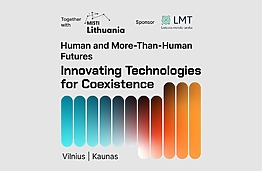Kaunas University of Technology is a competitive technical university fostering knowledge and innovations. The knowledge and technologies developed at Kaunas University of Technology reach all sectors of society, business and industry in Lithuania, the Baltic states, and worldwide.
Internationalisation at the university encompasses all areas of activity: quality of studies, scientific breakthroughs, and organisational coherence, and it is a key priority. Internationalisation is also reflected in the strategic documents of the university as well as all areas of its life. KTU does not only theoretically declare but lives by internationalism, constantly striving to demonstrate and extend the possibilities of global actions to all academic community members.
Today, the main priorities for developing internationalisation at KTU are:
(1) ECIU University – developing a European University;
(2) Attracting foreign academic employees and students;
(3) Creating an international image and promoting visibility in an international area;
(4) Cooperation with international education and research institutions.
The International Relations Department (IRD) plays an important role in the university aiming to put the international approach into practice. The department coordinates and manages international academic mobility for students and staff. IRD is also responsible for admitting full-time students from abroad, taking care of their legal status and academic recognition of foreign qualifications.
With the help of direct interaction, cultural and educational events, international students are encouraged to engage in the university’s vibrant multicultural community, pursue their learning goals and accumulate various life and learning experiences. By actively operating in foreign markets, KTU International Relations Department also highly contributes to raising awareness of the university.
KTU joined the Erasmus program in 1999. Until now, Erasmus+ programme remains the main financial instrument that helps the university students and employees to go abroad for studies and gain work experience in foreign organisations.
The international experience acquired by the academic community significantly impacts achieving strategic international goals established by the university. In addition, international experience is essential for developing internationalisation at home, which entails attracting international lecturers, organising international conferences and teaching weeks, fostering a local international community, and various other activities. All of these allow Kaunas University of Technology to strengthen its image in the eyes of the global academic community and show the public the advantages of internationalisation as a horizontal priority of all the activities carried out by the university.



